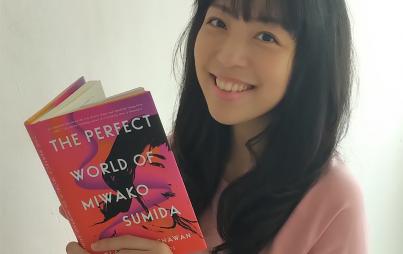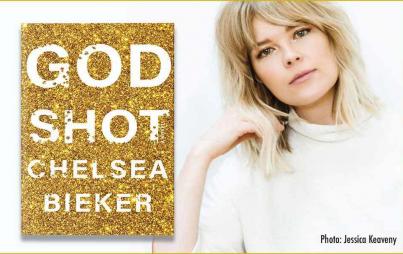
Photo courtesy of Jennifer Pastiloff.
Jen Pastiloff wants to help people. And by people, I mean pretty much everyone on the planet. She doesn’t just send “thoughts and prayers” to those in need; she gets on social media and makes things happen. She helps raise funds so single mothers can keep their lights on and babies can receive cancer treatment. She promotes fellow artists. She encourages us all to find beauty amidst the ruin.
Jen knows a thing or two about needing help. Born with tinnitus that has only worsened to the point that she can’t hear without supersonic hearing aids combined with reading lips, she’s also struggled with depression and anorexia. Convinced she needed to power through, that’s just what she did—until she figured out that her “Inner Asshole” was giving her some bad advice. So, she set about speaking her truth, and her truth had a lot to say!
Lucky for us, Jen channeled it into her tender, generous, heartbreaking, triumphant, and blisteringly wise book, On Being Human: A Memoir of Waking Up, Living Real, and Listening Hard. She takes us from an unsteady childhood through years (and years) of waitressing to, well, waking up and starting workshops that were theoretically about yoga, but really involved a whole heap of listening and truth speaking and beauty hunting.
I spoke with Jen via Skype. She was everything you’d expect: warm, witty, easy, smart, and very, very real.
♦♦♦
You’re truly one of the biggest-hearted people I know — always, always helping someone. Do you feel like you have some sort of calling?
I really love being of service. It lifts me up and comes very naturally for me, so maybe it’s a calling. I do feel like it’s one of my purposes in life. The ultimate thing is to love. And helping people looks so different all the time: sometimes it’s financially, sometimes it’s listening, sometimes it’s sharing a link on Facebook.
The work you do is so intimate. Do you ever worry you’ve said or done the “wrong” thing?
No, I don’t for a couple of reasons. I always make clear, I’m not a therapist, I’m just a person living their life, so take or leave what I say. And I always do the best that I can so I’m pretty good at not backtracking.
You’ve struggled with life-long tinnitus. Can you describe what it’s like to not know silence?
I always hear noise in my head. That’s what I equate with silence: a whooshing and a humming and a ringing. For me, the idea of silence is the absence of chatter in my mind rather than actual silence. That’s when I feel quiet.
I have moments, especially when I’m tired, where I feel sorry for myself. I get frustrated when I wake up with my family, and they’re talking to me, and I have no idea what they’re saying because I don’t sleep with my hearing aids in. But I don’t wallow in, what I call, my own suckery too much.
You’ve done the seemingly impossible and transformed your greatest struggles into your gift. How did you do this?
I think because I told the truth about who I was and had this attitude that this is me, take it or leave it. I also created this workshop that morphed over time. As I grew more confident in myself, I grew more confident in my workshops. I was able to get really low and get in someone’s face to lip read. I wouldn’t have done that before if I still felt the shame of hearing loss. And I also learned how to hear other ways, body ways, intuitive ways, and I just became really good at it. And I brought that into the workshop.

I believe you’re speaking about radical listening. What is this?
It’s listening without the intention of jumping in or trying to fix the situation. It’s about bearing witness. Just being there for someone. I think for most of us when we’re listening we’re waiting for our turn to talk. Or we’re waiting for how we can relate ourselves to it. Or how we can fix it. It’s also listening without judgment. Most people don’t have the experience of being seen and heard. So, when we provide that for people, it’s life changing.
Throughout your book, you marvel at the ability of humans to be two seemingly opposing things at once. In one example, you list: “Wholly unafraid and utterly terrified. Exposed and safe. Deaf and listening.”
It’s about acceptance; about stopping resisting. It’s easy to believe we have to have one loop of emotions, but that’s not true. For example, with the retreats I lead, there are often women who’ve lost children and gone through the deepest grief you can imagine, and yet as much as there’s crying, there’s so much laughter. In the midst of the greatest pain, we can have moments of joy. We get into trouble when we think we have to be just one way.
Acceptance can be a hard word.
It’s very tricky. It doesn’t mean — sit back and let life pass you by. It means — stop resisting what is. I used to get caught in the cycle of it’s not fair; why me? But it is me. So now I go to the Now What. This sucks, and now what?
You write a lot about how life-changing it is to inhabit our bodies. What does this feel like?
Sometimes when something upsets me, I immediately think, “Oh my god, I need a drink or a Xanax.” Inhabiting my body would be not self-medicating, and just breathing and letting myself feel whatever it is rather than trying to stuff it away or exercise it away or ignore it. Sometimes it feels like panic, and my heart is racing—and then it passes. Your body will signal you; it thinks it’s trying to protect you, right?
Why is it important to sit with your racing heart?
There’s a poem by Mary Oliver which has been a North Star for me — When Death Comes. The last line is, “I don’t want to end up simply having visited this world.” That’s why it’s important — so that you don’t end up being just a walking dead person. Be here, in your body, fully experiencing life as best as you’re able.
Why isn’t being in your mind experiencing life?
Well, it certainly is. But the mind can trick us when the body is more honest.
Every sentence of your book is potent, but the stand out for me is a line about your mom after she moves you back to New Jersey when you’re thirteen. “I believed she was ‘ruining my life,’” you write. “She was just a placeholder until I could find a true way to express my self-loathing.”
My feelings were so complicated with my mom after my dad died. I felt abandoned and that he’d left me with the enemy. And I felt angry with her for not saving him. But really, I was angriest with myself because I felt like I’d killed him. My last words to him were I hate you, and then later he unexpectedly died, and that guilt scarred me. I believed that I was a bad person. But that wasn’t conscious yet, it was in the unconscious, so I was just a real asshole to my mom. Then when I became anorexic, I found a way, a tool, to abuse myself. The truth is, I should have been in therapy all that time trying to metabolize the grief. But I wasn’t so it manifested in other ways.
You’re a big believer in people telling their stories. Why?
Everyone is so beautiful and complicated and has their own history, and the only way that we can understand each other is if we share our stories and listen to each other. Otherwise, we’re just walking around like walking dead people again. We’re self-involved. It’s a way to connect. Storytelling has kept the world going on as long as it has.
You have a complicated relationship with your depression meds, and I don’t think you’re alone in this. Why do you think needing help with mental imbalances can cause distress for some people?
There are myriad reasons: one of them is shame. The feeling that I should be able to do this, I should be strong, I should be able to exercise this away or meditate it away. My life isn’t as bad as so-and-sos. For me there’s no shame in taking medication, it’s just that it deadens me a little — I can’t tear up when I’m emotional, but I can’t be without it. I have to make a choice.
One of the more compelling observations in your book is how your Inner Asshole mislead you into believing that being strong meant you could “handle anything, any kind of loss, including my hearing.” You write, “Screw you, Inner Asshole, for making me feel like I was tough enough to withstand anything.” This is quite beautiful to me. And powerful. The realization that we can use our strength against ourselves.
The idea of strength is tricky. Now my strength is my ability to show my vulnerability, and before I thought strength meant nothing could affect me. But I had to do that to survive. Otherwise, that would have killed me: saying that to my dad, and then him dying. I didn’t think I’d be able to survive if I didn’t have armor on and walk around with this mantra of: “I am strong. I can withstand anything.” Now I don’t feel strong at all. I don’t mean that in a self-deprecating way. I feel like I’m strong, but not with the same connotation.
Can you talk about the difference between those two sorts of strengths?
The strength I have now lies in being honest, in saying I’m afraid and I’m doing it anyway. I don’t believe in the idea of being fearless. I think I’m fearless-ish. My strength is telling the truth about things that scare me, letting go of the shame.
What’s life like for you at the moment?
Life is great right now, but also weird. For instance, I became friends with Pink on Instagram. She loved my book; I went to her concert, and afterward, she said, “You’re amazing.” But I’m still in this tiny one-bedroom apartment, and I haven’t washed my hair in a week. So, my life is not different, and yet it is. I have to constantly battle old, old programming that the other shoe is going to drop, that good things don’t happen for me. What I’m working on is enjoying every moment of the process.
Is there anyone you wouldn’t help? Anything that would exclude people from your generosity or kindness?
I don’t know. It hasn’t happened yet.
Learn more about Jen and her book on her website.








